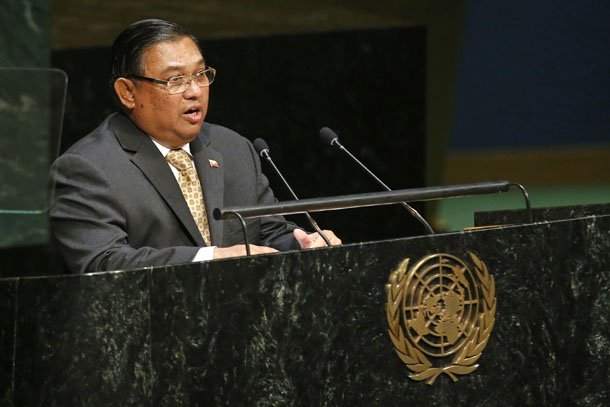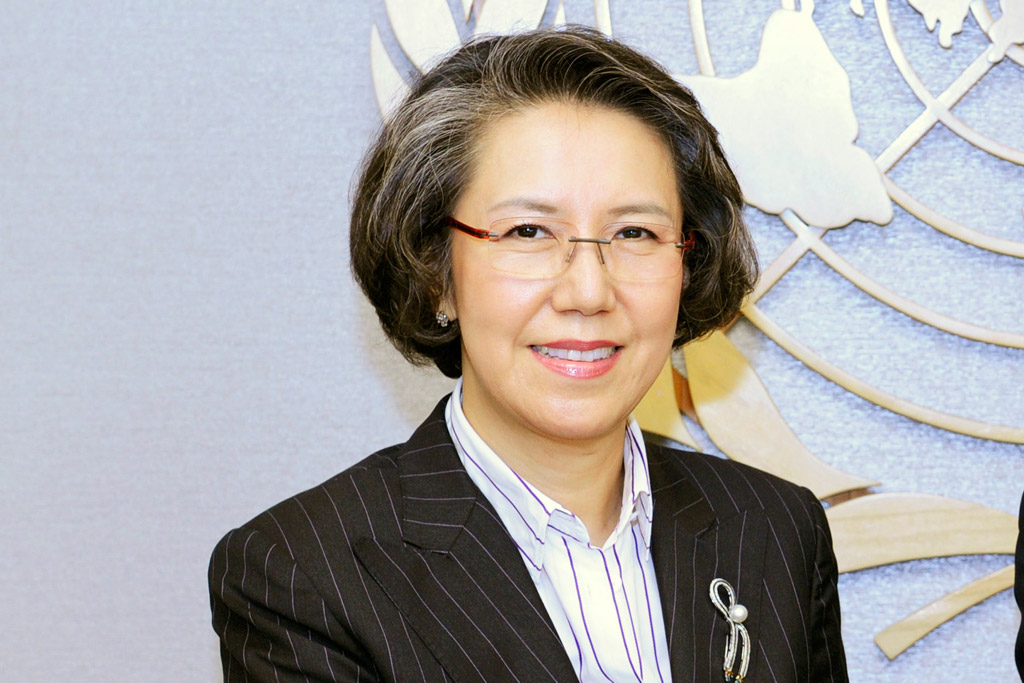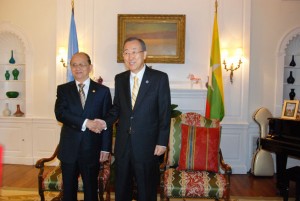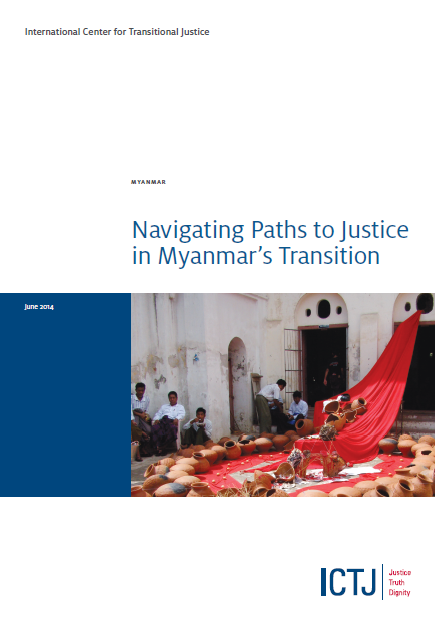Posts Tagged ‘UN General Assembly’ (33 found)
“Winds of Change” Blow a Gale of Human Rights Abuses
 Burma’s Foreign Minister, Wunna Maung Lwin, gave a glowing report on the progress towards democracy and respect for human rights in Burma at the UN General Assembly (UNGA) yet given the deteriorating human rights situation on the ground, it is difficult not to view his words as a North Korean-esque sting in the tail.
Burma’s Foreign Minister, Wunna Maung Lwin, gave a glowing report on the progress towards democracy and respect for human rights in Burma at the UN General Assembly (UNGA) yet given the deteriorating human rights situation on the ground, it is difficult not to view his words as a North Korean-esque sting in the tail.
Wunna Maung Lwin specifically requested that Burma be taken off the agenda of the Human Rights Council as well as the Third Committee of the UNGA, citing that “all major concerns related to human rights have been addressed to a larger extent in the new Myanmar.” Yet on closer inspection, this statement is preposterous, with the realities on the ground providing a striking contrast to these words.
Remarking on the peace process, the government is apparently “serious in its commitment” to making this work. The problem is that the government and the Burma Army say and do different things. As the government is making promises to ethnic armed groups, the Burma Army is still launching offensives in Kachin State and northern Shan State. Even with groups that have a ceasefire, the Burma Army continues its aggression, as seen in Kyeithi Township, Shan State over the weekend where it attacked Shan State Army – North positions yet again. Around 300 villagers have been forced to flee in this township alone in recent months due to attacks. This is emblematic of the current state of the peace process, where too much attention has been placed on the signing of a nationwide ceasefire agreement. Yet as recent clashes indicate, a ceasefire simply isn’t enough to rein in the Burma Army, and this state of affairs remains volatile, as the recent briefing paper produced by Burma Partnership explains […]
• • •Two New Briefers: The State of Burma’s Peace Process and Shrinking Space for Civil Society in Burma
Burma Partnership has produced two new briefing papers in connection with Burma-related advocacy at the current 69th session of the UN General Assembly […]
• • •New Special Rapporteur, Familiar Human Rights Abuses
 The new Special Rapporteur on the situation of human rights in Burma, Ms. Yang Hee Lee, concluded her first visit to the country on 27 November, and unsurprisingly, found the human rights situation troubling, warning of the potential of backtracking on initial reforms, an analysis that resonates with many Burma followers. She outlined her initial findings at Rangoon airport in a statement just as she finished her mission, highlighting the shrinking of democratic space, the ongoing religious violence and discrimination, the deteriorating humanitarian conditions for internally displaced persons (IDPs) – especially Muslims – in Arakan State, the severe human rights abuses in Kachin State, the urgent necessity for legislative reform and the rule of law, the lack of involvement of women in both the peace process and governance, the exclusion of local people in large scale development projects and the impact of such projects on vulnerable communities, and the continuing incarceration of political activists, among other issues.
The new Special Rapporteur on the situation of human rights in Burma, Ms. Yang Hee Lee, concluded her first visit to the country on 27 November, and unsurprisingly, found the human rights situation troubling, warning of the potential of backtracking on initial reforms, an analysis that resonates with many Burma followers. She outlined her initial findings at Rangoon airport in a statement just as she finished her mission, highlighting the shrinking of democratic space, the ongoing religious violence and discrimination, the deteriorating humanitarian conditions for internally displaced persons (IDPs) – especially Muslims – in Arakan State, the severe human rights abuses in Kachin State, the urgent necessity for legislative reform and the rule of law, the lack of involvement of women in both the peace process and governance, the exclusion of local people in large scale development projects and the impact of such projects on vulnerable communities, and the continuing incarceration of political activists, among other issues.
We welcome Ms. Lee’s open and honest discussion of the term “Rohingya” and her pledge to be guided by international human rights law as regards the use of this term. This was despite the insistence of government officials not to use the word “Rohingya” throughout her trip to Arakan State. On the basis of this principled stance, we are reassured that Ms. Lee will not flinch from using the term when appropriate in the future. After visiting two camps for IDPs, one for Arakan Buddhists and one for Rohingya Muslims, Ms. Lee was troubled by both the terrible conditions in the camps and the lack of humanitarian access that is resulting in people dying due to insufficient medical assistance. She also acknowledged that this situation is “undeniably worse” in the camp for Rohingya. While she did not explicitly state that this is a situation engineered and maintained by the authorities, it is obvious that the unequal treatment of Buddhist and Muslim IDPs is a deliberate policy by the government that further punishes the Rohingya simply due to their ethnicity.
• • •Navigating Paths to Justice in Myanmar’s Transition
Since President Thein Sein and his government took office in 2011, Myanmar’s transition has unfolded at a pace that has surprised many and earned the acclaim of western governments, financial institutions, and private-sector investment analysts.1 The Burmese population of approximately 60 million has endured more than a half-century of military dictatorship, armed conflict, economic dysfunction, and political repression.2 A meaningful transformation into a peaceful society that enjoys economic development and functions democratically now seems plausible, though it is far from guaranteed. Ultimately, the blanket immunity afforded by the 2008 Constitution shields the acts attributable to prior regimes from any form of accountability.3 Whether the reform process will evolve to include measures that address the massive and systematic injustices of the past remains less certain.
• • •UN General Assembly: Establish Clear Benchmarks to Address Continuing Abuses in Myanmar
Wartime Abuses in Kachin State, “Ethnic Cleansing” in Rakhine State, Tens of Thousands Denied Access to Aid
The United Nations General Assembly should adopt a strong and comprehensive resolution on the situation of human rights in Myanmar to promote much-needed human rights reform in the country, Fortify Rights said today. When it considers a forthcoming resolution on Myanmar, the UN General Assembly should condemn the wide range of ongoing human rights violations by the government and armed forces of Myanmar and provide clear benchmarks for measurable improvement, including establishing the presence of the UN Office of the High Commissioner for Human Rights (OHCHR) in Myanmar […]
• • •UK Must Ensure UN General Assembly Burma Resolution Tackles Sexual Violence
Burma Campaign UK today called on the British government to ensure that ending rape and sexual violence in Burma is included in the UN General Assembly resolution on Burma, a draft of which is expected to be completed by the European Union this week.
Burma Campaign UK also called on the British government to raise rape and sexual violence in Burma when the United Nations Security Council discusses Women Peace and Security on 18th October […]
• • •Catherine Ashton Urged To Free Thant Zin Htet
Burma Campaign UK today highlights the case of Thant Zin Htet as political prisoner of the month in our No Political Prisoner Left Behind campaign, and urged EU High Representative Catherine Ashton, who oversees the drafting the UN General Assembly Resolution on Burma, to include demands for action in the resolution which will help solve the problem of political prisoners once and for all […]
• • •AIPMC Welcomes UNGA Resolution on Burma, Calls for Urgent Action to Protect Human Rights and Deliver Humanitarian Assistance to IDPs
The ASEAN Inter-Parliamentary Myanmar Caucus (AIPMC) today welcomed the United Nations General Assembly resolution on human rights in Myanmar as well as the Myanmar mission’s acceptance of that resolution, backing calls for urgent action to be taken to ensure humanitarian aid and protection for tens of thousands of forcibly displaced peoples in the country […]
• • •President Thein Sein’s UN Speech Disguises the Truth Behind Burma’s Reforms
 As President Thein Sein was busy at the UN General Assembly describing “the amazing changes” in Burma as “irreversible,” the Burma Army offensive in Kachin State continues unabated, hundreds of political prisoners remain incarcerated and peaceful protesters are detained and summoned to court. The reality of the changes in Burma is that they are merely tentative and minimal; substantive change is yet to occur.
As President Thein Sein was busy at the UN General Assembly describing “the amazing changes” in Burma as “irreversible,” the Burma Army offensive in Kachin State continues unabated, hundreds of political prisoners remain incarcerated and peaceful protesters are detained and summoned to court. The reality of the changes in Burma is that they are merely tentative and minimal; substantive change is yet to occur.
This reality is perhaps most keenly felt in Kachin State where more and more people are fleeing their homes as clashes continue. President Thein Sein addressed the Kachin issue by stating that the government’s Peace Negotiation Team and the Kachin Independence Army (KIA) are “working to further strengthen the confidence building measures.” Yet what confidence measures are these? Human rights violations are ongoing while more and more troops are being sent to the frontlines. The government is also blocking humanitarian aid. These are not confidence building measures. It is of no surprise that members of the Kachin community in the US staged protests at President Thein Sein’s visit and wrote an open letter to Thein Sein urging him to “stop the harassment, interrogation, and detention of innocent Kachin civilians by the local authorities.” […]
BROUK Appeal to World Body to Put Pressure on President Thein Sein’s Rohingya Ethnic Cleansing Proposal
Today, Burmese Rohingya Organisation UK appeals to world leaders at the UN General Assembly to put pressure on President Thein Sein following his proposal to remove all Rohingya people from Burma and place them in third countries.
After President Thein Sein’s proposal, Burmese Rohingya Organisation UK (BROUK) has received reports till today that there have been mass arrests with Rohingya people kept in detention camps without trial, without food or medical services […]
• • •









 All posts
All posts